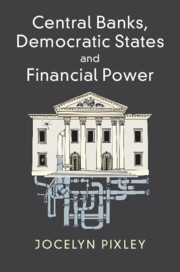Book contents
- Central Banks, Democratic States and Financial Power
- Central Banks, Democratic States and Financial Power
- Copyright page
- Dedication
- Contents
- Figures
- Tables
- Acknowledgements
- 1 Who Wanted Central Banks?
- 2 War Finance, Capitalist Banks: Shared Monetary Sovereignty
- 3 Peace Finance of Bankers’ Ramps, 1920s–1930s
- 4 Central Banks, Democratic Hope, 1930s–1970s
- 5 Vietnam War, Dollar Float and Nixon
- 6 The Great Inflation Scares of the Phillips Curve
- 7 Pseudo-Independent Central Banks and Inflation-Target Prisons
- 8 The State of Monetary Sovereignty
- 9 Searching for the Absurd in Central Banking
- References
- Index
1 - Who Wanted Central Banks?
Published online by Cambridge University Press: 27 September 2018
- Central Banks, Democratic States and Financial Power
- Central Banks, Democratic States and Financial Power
- Copyright page
- Dedication
- Contents
- Figures
- Tables
- Acknowledgements
- 1 Who Wanted Central Banks?
- 2 War Finance, Capitalist Banks: Shared Monetary Sovereignty
- 3 Peace Finance of Bankers’ Ramps, 1920s–1930s
- 4 Central Banks, Democratic Hope, 1930s–1970s
- 5 Vietnam War, Dollar Float and Nixon
- 6 The Great Inflation Scares of the Phillips Curve
- 7 Pseudo-Independent Central Banks and Inflation-Target Prisons
- 8 The State of Monetary Sovereignty
- 9 Searching for the Absurd in Central Banking
- References
- Index
Summary
- Type
- Chapter
- Information
- Central Banks, Democratic States and Financial Power , pp. 1 - 56Publisher: Cambridge University PressPrint publication year: 2018



